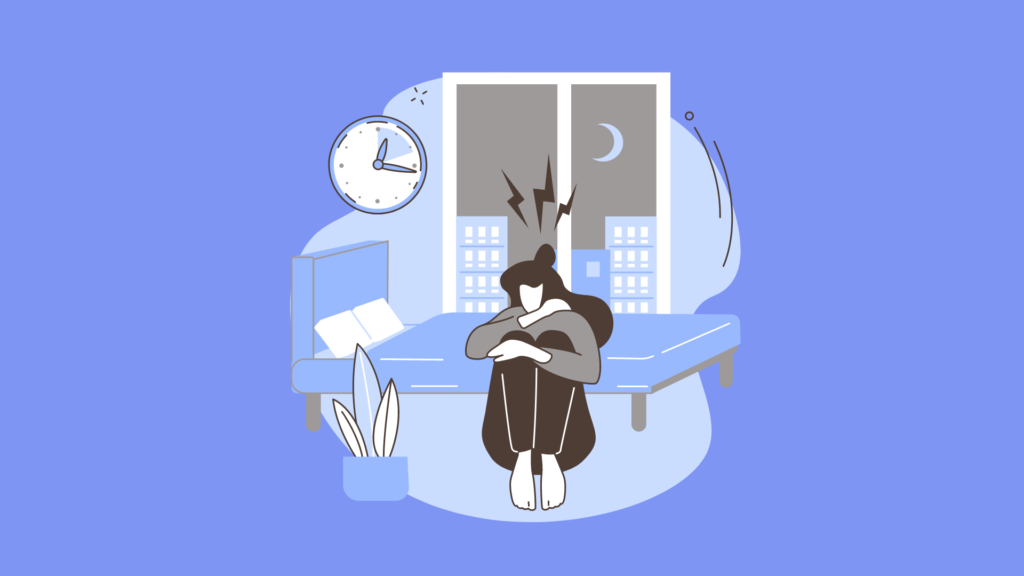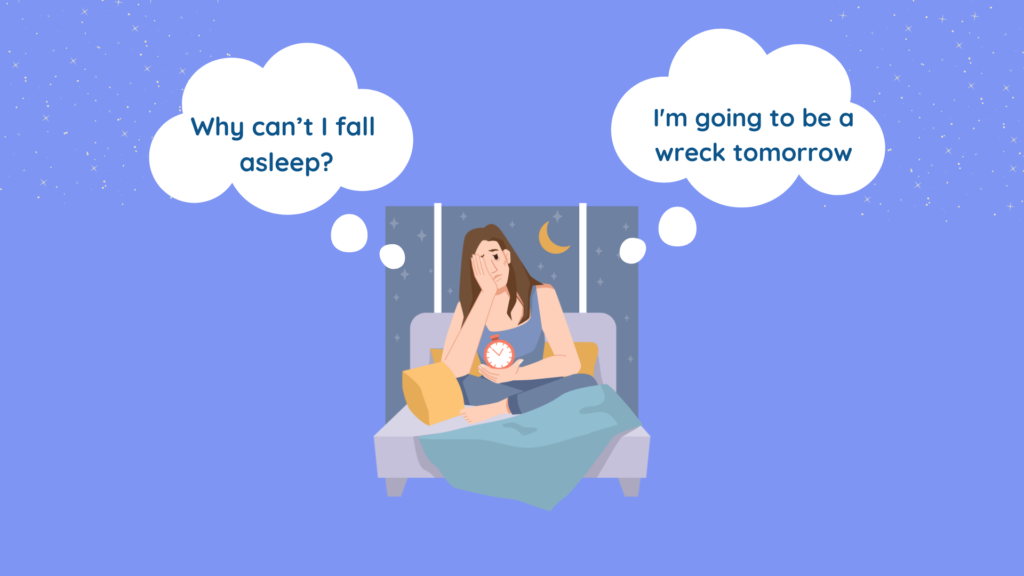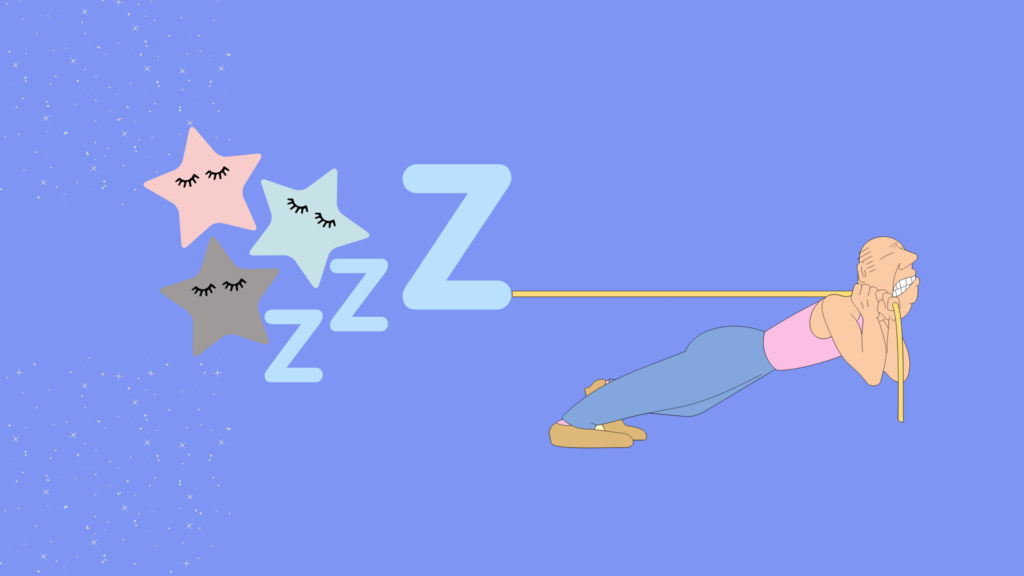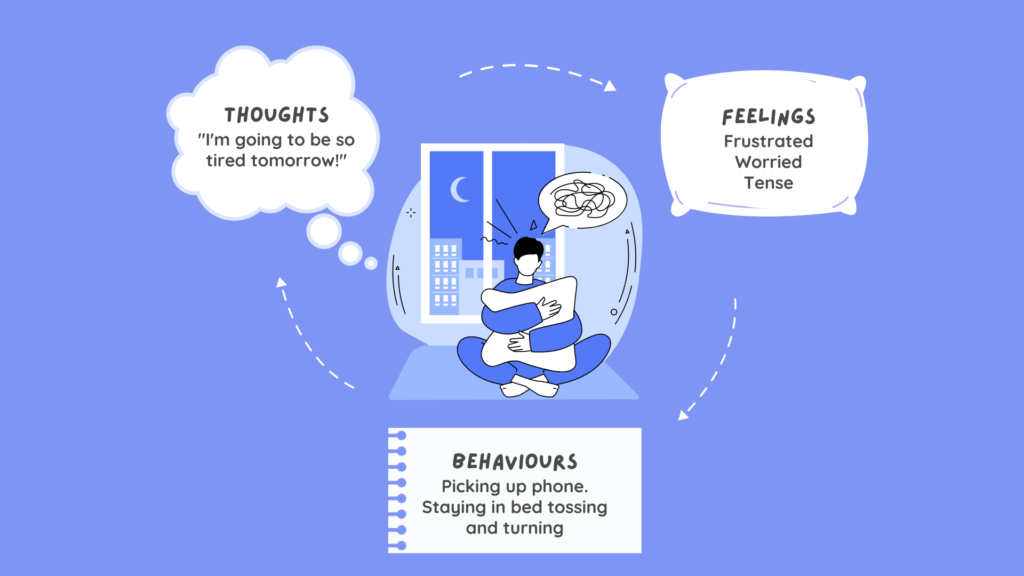Wide Awake and Worried: the Link Between Insomnia and Anxiety

Clinically reviewed by Katie Dobinson and Samantha Tang.
A key driver of sleep difficulties is the process of worry, whereby we think about the ‘what ifs’ of a situation and worst case scenarios. The focus of the worry in insomnia is about sleep and the possible impacts of poor sleep.
Unfortunately, the more we worry about sleep, the more awake our mind and body becomes, making it even harder to sleep.
It’s like a tug of war with insomnia. When you can’t sleep, you tug harder, but that makes insomnia tug right back.
Certain things we do to try and fall asleep – such as staying in bed, scrolling our phones and taking daytime naps – can also cause the insomnia to tug harder by making us feel more awake at night.
Loss of sleep can impact our lives in many ways. It affects our decision-making and makes us more vulnerable to experiencing difficult emotions, such as anxiety. Sleep deprivation has also been found to impact how we perceive things, making us more likely to view certain situations as dangerous or threatening compared to when we have slept well.
Sleep is essential to our overall wellbeing, and improving the quality of our sleep can often help to reduce symptoms of anxiety and low mood.
You can learn to overcome difficulties with insomnia with Cognitive Behaviour Therapy (CBT). CBT helps you to identify and shift unhelpful thoughts and behaviours that are getting in the way of your sleep.
A little known fact is that CBT is the ‘gold standard’ treatment for insomnia, meaning it has the strongest evidence base for effectively treating insomnia. Whilst sleeping pills are often used as a ‘quick fix’ for insomnia, they may not help to treat its underlying cause. In contrast, CBT can help to achieve lasting changes that lead to many good nights of sleep ahead.
Our evidence-based Insomnia Program uses CBT to teach you proven strategies for tackling common sleep problems.
You’re dreaming! Simple ways to overcome sleep worries
Below are some of the key treatment strategies that can reduce worry about sleep and have you feeling rested and restored:
- Keep a Sleep Diary – A Sleep Diary involves keeping track of your sleep, to better understand what might be getting in the way of a good night’s sleep. Each morning, take note of important information about the previous nights’ sleep, which you can later use to help you improve your sleep habits. You can access a free Sleep Diary through the Insomnia Program.
- Quieten your mind with ‘Worry Time’ – If you tend to worry about the day’s events when your head hits the pillow, creating a dedicated ‘worry time’ well before your bed time will help to quieten your mind. ‘Worry Time’ involves designating a specific 10 minutes of your day to focus on any worries you have. If worries arise outside of this time, you can postpone the worry until ‘Worry Time’, and allow yourself to refocus your attention.
- Challenge Sleep-Related Worries – if you notice yourself lying in bed worrying about the impact of poor sleep, try to question the validity of these worries. While it may be true that you will feel tired the following day, it may not be true that the day will be a complete write-off.
- Create ‘Bed Boundaries’ – It’s important to associate your bed with feeling tired, and sleep, rather than with worrying. If you find yourself lying in bed worrying about sleep, try getting out of bed and engaging in a relaxing activity (e.g., reading), returning to bed only once you feel sleepy.
- Create a Wind-Down Routine – It’s important to engage in relaxing activities that are not activating before bed time. This helps the body to relax and know that it’s time for rest. This might mean reading, having a shower, stretching, having a warm drink, or otherwise.
Learn more helpful tips, tools and strategies to help you sleep better and feel less anxious by enrolling into our FREE Insomnia Program.
If you’re not sure if this is the right program for you – try our free, anonymous Take-a-Test Tool for program recommendations based on how you’re feeling.
Not Sure which program is for you?
Take a Test to Help You Choose a Program
If you’re unsure which program to pick, take our anonymous online test to check how you feel and see which program may be suitable. This test will show you your levels of stress, anxiety, or depression and will make suggestions on what you can do next.








